

Herman hesse. I want to introduce you to a website, a game designer and a very interesting and peculiar game.
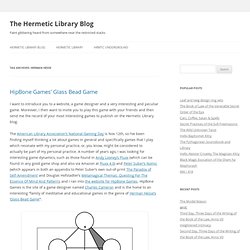
Moreover, I then want to invite you to play this game with your friends and then send me the record of your most interesting games to publish on the Hermetic Library blog. The American Library Association’s National Gaming Day is Nov 12th, so I’ve been finding myself thinking a lot about games in general and specifically games that I play which resonate with my personal practice, or, you know, might be considered to actually be part of my personal practice. A number of years ago, I was looking for interesting game dynamics, such as those found in Andy Looney’s Fluxx (which can be found in any good game shop and also via Amazon at Fluxx 4.0 ) and Peter Suber’s Nomic (which appears in both an appendix to Peter Suber’s own out-of-print The Paradox of Self-Amendment.
Alchemical Laboratory. C. G. Jung and the Alchemical Renewal. Gnosis Archive | Library | Bookstore | Index | Web Lectures | Ecclesia Gnostica | Gnostic Society by Stephan A.
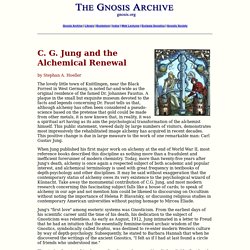
Hoeller The lovely little town of Knittlingen, near the Black Forrest in West Germany, is noted far-and-wide as the original residence of the famed Dr. Johannes Faustus. A plaque in the small but exquisite museum devoted to the facts and legends concerning Dr. When Jung published his first major work on alchemy at the end of World War II, most reference books described this discipline as nothing more than a fraudulent and inefficient forerunner of modern chemistry. Jung's "first love" among esoteric systems was Gnosticism. The circle of ancient friends was a fragile one, however. In all this devoted study, Jung was disturbed by one principal difficulty: The ancient Gnostic myths and traditions were some seventeen or eighteen hundred years old, and no living link seemed to exist that might join them to Jung's own time.
In 1926 Jung had a remarkable dream. Chinese wisdom and Dr. Psychology and Alchemy. Psychology and Alchemy is Volume 12 in The Collected Works of C.
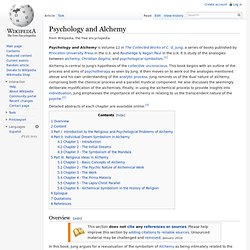
G. Jung, a series of books published by Princeton University Press in the U.S. and Routledge & Kegan Paul in the U.K. It is study of the analogies between alchemy, Christian dogma, and psychological symbolism.[1] Detailed abstracts of each chapter are available online.[3] Overview[edit] Alchemy. The Emerald Tablet, a key text of Western Alchemy, in a 17th-century edition Alchemy is an influential philosophical tradition whose practitioners have, from antiquity, claimed it to be the precursor to profound powers.
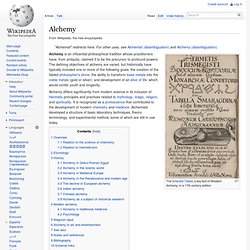
The defining objectives of alchemy are varied, but historically have typically included one or more of the following goals: the creation of the fabled philosopher's stone; the ability to transform base metals into the noble metals (gold or silver); and development of an elixir of life, which would confer youth and longevity. Overview[edit] Emerald tablets. Tabula Smaragdina.
The Great Art - Alchemy. The Nature and History and The Great Art of Alchemy Ed Reither University of New Orleans "The changing of bodies into light and light into bodies, is very comfortable to the course of nature, which seems delighted with transmutations.
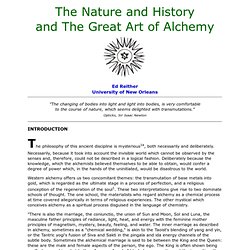
" Opticks, Sir Isaac Newton. The Alchemy Web Site. Chemical wedding. Hermes and Hermeticism. Gnosis Archive | Library | Bookstore | Index | Web Lectures | Ecclesia Gnostica | Gnostic Society by Stephan A.
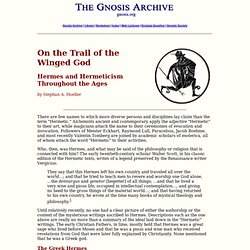
Hoeller There are few names to which more diverse persons and disciplines lay claim than the term "Hermetic. " Alchemists ancient and contemporary apply the adjective "Hermetic" to their art, while magicians attach the name to their ceremonies of evocation and invocation. Followers of Meister Eckhart, Raymond Lull, Paracelsus, Jacob Boehme, and most recently Valentin Tomberg are joined by academic scholars of esoterica, all of whom attach the word "Hermetic" to their activities.
Who, then, was Hermes, and what may be said of the philosophy or religion that is connected with him? The Wisdom of the Egyptians: Chapter V: Hermes Trismegistus. Sacred Texts Egypt Index Previous Next p. 178 HERMES TRISMEGISTUS, "the thrice greatest Hermes.
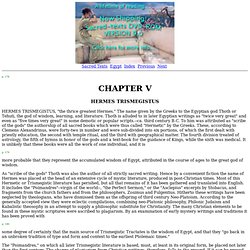
" The name given by the Greeks to the Egyptian god Thoth or Tehuti, the god of wisdom, learning, and literature. Thoth is alluded to in later Egyptian writings as "twice very great" and even as "five times very great" in some demotic or popular scripts. --ca. third century B.C. P. 179. Alchemy Journal Vol.3 No.4. The Life and Legacy of Hermes Trismegistus by Jamie McGraw Who Was Hermes Trismegistus?
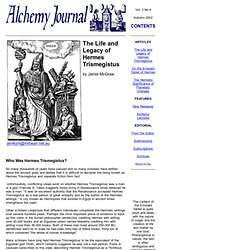
So many thousands of years have passed and so many scholars have written about the ancient gods and deities that it is difficult to decipher the being known as Hermes Trismegistus and separate fiction from fact. Unfortunately, conflicting views exist on whether Hermes Trismegistus was a man or a god. Frances A. Other scholars conjecture that different individuals completed the Hermetic writings over several hundred years.
Many scholars have long held Hermes Trismegistus to be the equivalent of the Egyptian god Thoth, which certainly suggests he was not a real person.